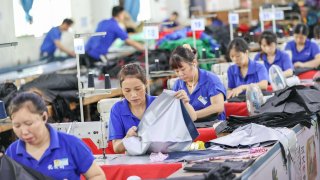
- Asian exporters will face significant challenges as demand from major markets like the U.S., Europe and China slow down in the coming months, according to the chief Asia economist of HSBC.
- Manufacturers in Europe are already pulling back quite significantly, namely in Germany, Frederic Neumann told CNBC's "Squawk Box Asia" on Monday.
- "Remember that Europe is a major export market for Asian exporters," the economist pointed out.
Asian exporters will face significant challenges as demand from major markets like the U.S., Europe and China slow down in the coming months, according to the chief Asia economist of HSBC.
Manufacturers in Europe are already pulling back quite significantly, namely in Germany, Frederic Neumann told CNBC's "Squawk Box Asia" on Monday.
Get South Florida local news, weather forecasts and entertainment stories to your inbox. Sign up for NBC South Florida newsletters.
"Remember that Europe is a major export market for Asian exporters," the economist pointed out.
"We also expect essentially a decline in shipments coming through the second half of the year, which complements the pivot in U.S. spending away from goods. Both of the U.S. and Europe slowing down is going to be headwinds for Asian exporters," he added.
The slowdown in China's economy will further add to the problems facing exporters in the region, Neumann said.
Money Report
"Very clearly the trade data… shows this weakness in domestic demand. China is the third big export market that we really need to be humming — that too looks like it's not really picking up steam. From that perspective, a trade recession cannot be ruled out at this point," he added.
China's weak growth
China's official manufacturing purchasing managers' index fell to 49.0 in July from 50.2 in June, the National Bureau of Statistics (NBS) said last week.
PMI readings are sequential and represent month-on-month expansion or contraction. A reading above 50 suggest growth while anything below 50 indicates contraction.
China, which saw its economy grow only 0.4% year-over-year in the second quarter, is a key export market for many Asian countries. Therefore, a slowdown in the world's second largest economy will have an overall impact on the entire region.
"The manufacturing sector is really the most brittle part of the global economy at the moment," said Neumann.
"That's where we're seeing the first signs of weakness coming through whether in the U.S., whether in mainland China, whether in Europe," he said, adding the slowdown will have a trickle down effect on Asia's growth.
"Asia particularly depends on the global manufacturing sector economies like [South] Korea, Japan, Taiwan — all of them are very much exposed to global manufacturing demand. So that slowing immediately is going to transmit into slower growth in Asia," Neumann said.
Inflationary pressure
The weak global manufacturing outlook is further complicated by soaring inflation across the region, according to the economist.
"We also have the inflation problem. That's going to be a sticky one… and we think that will last with us well into year, despite the slowdown in manufacturing," said Neumann.
Commodity prices have started to "come off the boil," which could put a damper on headline inflation, he said. However, underlying core inflation remains high — partly driven by wages and supply chain disruptions, he noted.
This will likely hurt Asia's exporters as core inflation will likely add to price pressures, Neumann added.
"Make no mistake, we are looking at very sticky core inflation," Neumann said. "And of course, supply chain disruptions in Asia are not helping on this front in terms of bringing down price pressures in the coming months."






